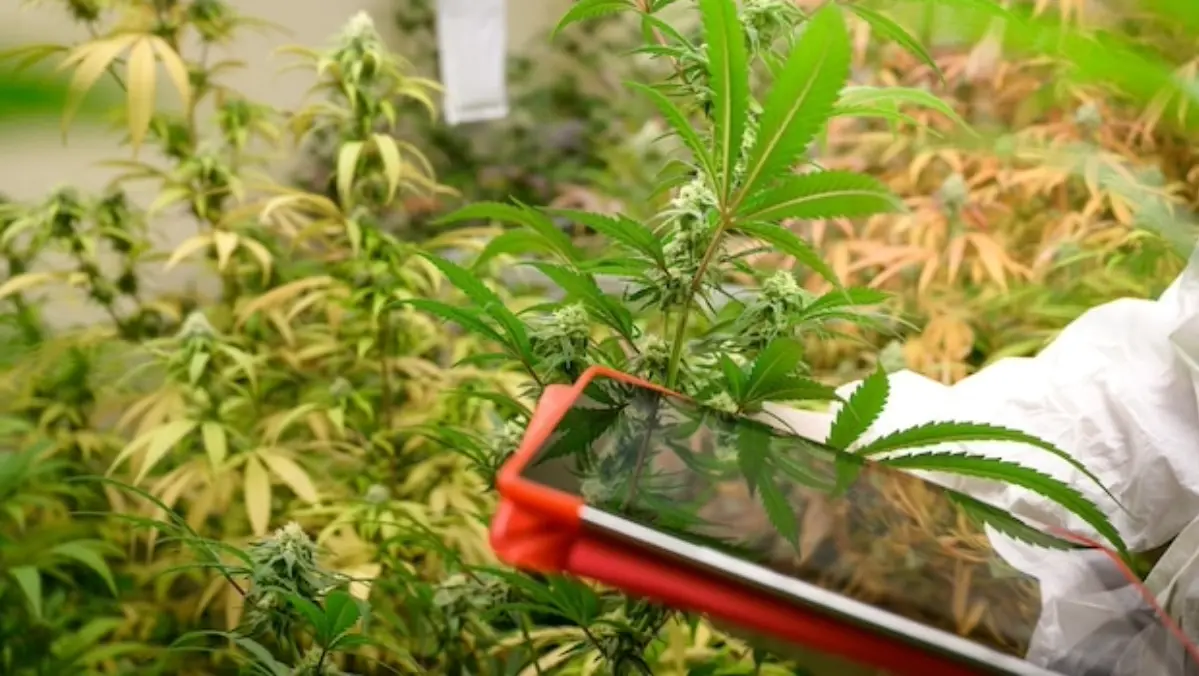
April 28, 2025

Innovation and technology are coming together to bring about an era of growth and transformation in the ever-changing cannabis business. With changing legal frameworks and public opinions bringing about a paradigm shift in cannabis's global perception, technology is playing a pivotal role in redefining the industry's structure.
The cannabis industry is undergoing an enormous change, going from hidden to widespread, thanks to several revolutionary technological developments. Modern cannabis farming goes above and beyond conventional methods by incorporating AI, precision agriculture, and automation. Technology is revolutionizing the agriculture process at every step, from seed to harvest, making it more efficient, consistent, and of high quality.
Genome sequencing and CRISPR technologies are enabling the creation of specialized strains with targeted therapeutic characteristics, leading to a revolution in the field of genetics and breeding as a whole. The once mysterious and unpredictable nature of cannabis cultivation is giving way to scientific precision and predictability.
Processing and extraction technology improvements are radically altering the cannabis product manufacturing process. To make cannabis more bioavailable, scientists are turning to nanotechnology, and automation is making production more efficient. With blockchain giving a clear path from production to consumption and AI-driven systems verifying the safety and potency of goods, quality control, and testing have reached unparalleled levels.
There are several ways in which technology is changing the cannabis market, and this article explores them all.
As the cannabis business continues to change, automated cultivation methods are leading the way in terms of efficiency and output. Nowadays, advanced technology controls every step of the cannabis plant's life cycle, replacing the era of relying solely on physical labor. With the promise of higher yields, lower costs, and more consistency, automation is transforming the cannabis cultivation process from seeding to harvesting.
Innovative technologies exist in automated agriculture systems. Planting, pruning, and harvesting are just a few of the complex things advanced automation can easily manage, reducing the likelihood of human mistakes. In carefully controlled settings, these automation systems optimize conditions for cannabis plants to grow, taking into account factors like humidity, temperature, and nutritional levels.

Efficiency is just one of the many advantages of automation. These systems can adjust to each plant's unique requirements, allowing for maximum growth by utilizing data analytics. The end product is of such high quality and consistency that it is difficult to accomplish using more conventional means.
The development of fully automated cultivation systems has revolutionized the cannabis industry's approach to resource management and sustainability while simultaneously changing the output volume. The integration of cutting-edge cannabis technology, especially in the realm of cannabis cultivation technology, is revolutionizing the efficiency, precision, and sustainability of the entire cannabis production process.
Growing cannabis has never been more accessible, thanks to the widespread use of artificial intelligence (AI), which has given farmers new insights and more control over what they grow. In order to improve plant health, increase production, and streamline the use of resources, AI-driven growth monitoring examines vast data sets and goes beyond simple observation.
Here, AI is a digital agronomist, keeping eyes on things like soil moisture, nutrient levels, and weather conditions in real-time. Algorithms trained on this data in real-time find connections and patterns that direct the best ways to cultivate the plants. For example, in plant diseases and nutritional deficits, AI can identify the first symptoms so that farmers may act quickly to save their crops.
The integration of AI into growth monitoring doesn't just stop at reactive measures; it extends to predictive analytics. Cultivators can better use their resources when AI learns from past data to predict future growth trends. This predictive capability empowers growers to optimize their operations, minimize risks, and stay ahead in an industry where accuracy and anticipation are paramount. Cannabis growers, with the help of technology, are shaping the dynamic landscape of the cannabis space, ushering in a new era of horticultural excellence.
Finding valuable market insights has become essential for companies aiming to succeed in the rapidly developing cannabis industry. CannaBI Analytics plays a vital role in this ever-changing industry because it provides growers, distributors, and retailers with data analytics solutions that help them uncover hidden opportunities.
Thanks to its extensive feature set, CannaBI Analytics has become an integral part of cannabis businesses. The platform allows for an in-depth understanding of the market dynamics through:
Businesses may customize their data-driven strategies to fit their individual needs with CannaBI Analytics' configurable, out-of-the-box capabilities.
Notable among the platform's features is its real-time data management, which provides a comprehensive perspective by combining data from many sources. This promotes a standard knowledge of the market environment by ensuring that measurements and standards are consistent across all applications. Companies seeking to succeed in the cannabis market will find CannaBI Analytics to be a vital resource for making well-informed, consistent decisions.
In a rapidly changing business, CannaBI Analytics stands out with its eye-catching visuals. With these self-service features, employees may build dashboards specific to their jobs, encouraging them to interact with the data more deeply. A simple visual representation of market patterns is provided by real-time maps, which update in tandem with data changes and offer a dynamic perspective.
Among the many features offered by CannaBI Analytics is comprehensive key performance indicator management. This focal point defines the company's essential performance metrics uniformly. With role-based access, employees can be sure to see the key performance indicators (KPIs) that are most relevant to their jobs, which helps them get a more nuanced picture of how the market is doing.
With CannaBI Analytics, cannabis companies can access powerful analytics tools for their data-savvy employees. Discover complex insights vital for decision-making by exploring massive datasets with limitless dimensions using the "point and click" analytics tool. Predictive analytics and built-in forecasting capabilities introduce a new level of intelligence. This enables companies to make proactive decisions by anticipating market trends.
The revolutionary method of cultivation known as precision agriculture is making an everlasting impression on the cannabis business. By using technology, this strategy meticulously customizes farming practices to meet the specific demands of each plant. Acquiring cannabis through precision agriculture allows for more efficient use of resources, higher quality crops, and more environmentally friendly agricultural methods.

A key component of cannabis precision agriculture is the application of sensor technologies. These sensors record information about soil type, moisture levels, and other environmental variables. This real-time data may be integrated into cultivation decisions to make sure that every plant gets the right amount of nutrients and appropriate conditions for optimal growth.
Additionally, data analytics, robots, and automation all work together in precision agriculture's closed-loop system to make things better every time.
New extraction techniques are revolutionizing the cannabis market by changing the way cannabinoids are harvested from the plant. Modern approaches are replacing older ones, such as solvent-based extraction, which lowers the quality, efficiency, and purity of cannabis-derived goods.
Supercritical CO2 extraction is one innovation that stands out. To effectively remove cannabis without leaving behind toxic byproducts, this technique makes use of supercritical carbon dioxide, which functions as a gas and a liquid. A purer and more potent extract is the end product, which satisfies the constant expectations of both customers and regulators.
In addition, new extraction techniques are being developed to extract all of the therapeutic chemicals found in cannabis, including cannabinoids, terpenes, and others. Extraction and isolation of individual components by methods like fractional distillation and chromatography opens the way for developing individualized formulations with precise effects and flavors.
These developments in extraction techniques not only improve the final product's quality but also open the door to new formulations and ways of consumption as the marijuana market grows. The ever-changing world of extraction technologies plays a vital role in providing the varied needs of modern cannabis consumers, who want anything from concentrated oils to edibles with precise dosages.
Würk stands out as a leading participant in the dynamic cannabis business, where technology is a crucial driver, by providing a comprehensive solution for workforce management that aligns with the game-changing technological advancements that will define the industry's future.
When it comes to tech-driven advancements, Würk's all-in-one workforce management system is a significant player. It tackles the complex issues that cannabis businesses encounter. When it comes to managing payroll, HR, timekeeping, scheduling, and tax regulations, the platform goes above and beyond what is often offered by HR programs.
Throughout the cannabis industry's story, compliance plays a pivotal role, and Würk is at the forefront. The software helps cannabis companies stay compliant in a regulatory landscape that is constantly evolving, making it easier for them to manage complex local and national legislation. When it comes to 280E tax legislation, accounting, and banking, Würk is more than just a workforce management authority; it's a trusted counsel that enables businesses to prosper in a regulatory environment that's constantly changing.
The cannabis industry's technological advancements vary from state to state. Because of this variety, Würk builds its platform with national scalability in mind, considering the nuanced nature of other jurisdictions' rules and regulations. Businesses are able to easily conform to regulations at the federal and state levels because of this flexibility.
Automation is becoming more critical in the fast-paced cannabis product manufacturing industry, significantly improving production processes in terms of efficiency, consistency, and flexibility. The cannabis manufacturing business is being revolutionized by automation technologies, which are improving efficiency. This includes everything from growing the initial ingredients to packing the finished goods.
Automated arms carefully manage growing, cutting, and harvesting in automated cultivation systems, guaranteeing that cannabis plants are developed in ideal circumstances.
The cultivation process becomes more precise and high-quality, and labor costs are reduced as a result. These systems are improved even further by incorporating data analytics, which enables real-time monitoring and adjustment depending on environmental factors.
The use of automation in both the extraction and processing stages is improving the yield of chemicals obtained from cannabis. Consistent and reliable outcomes are guaranteed by large-scale extraction equipment that is controlled by complex algorithms. To satisfy the growing need for controlled cannabinoids utilized in medications, health items, and recreational consumables, this degree of accuracy is of the greatest significance.

In addition to extraction, the production of cannabis goods includes the careful mixing and production of a wide variety of products, including edibles, tinctures, and topical creams. Automated production keeps each product unaltered during the whole manufacturing process, ensuring precise dosing, packing, and labeling,
In addition to improving consistency and efficiency, automation is playing an increasingly important role in the cannabis manufacturing situation in terms of meeting strict legal regulations. A future where high-quality cannabis products are both accessible and manufactured with a level of accuracy that matches the increasing expectations of regulators and consumers is being accomplished by the industry's cooperation with technology and manufacturing expertise.
An innovative revolution is taking place in the cannabis production industry, where AI-assisted quality assurance is bringing a new degree of accuracy and dependability to the evaluation of product quality. Although they work, the limits of traditional quality control procedures are based on human inspection and other similar processes. Here is an artificial intelligence, a technical powerhouse transforming how cannabis products are evaluated for quality, potency, and purity.
Quality assurance systems with artificial intelligence use machine learning algorithms that quickly handle massive datasets. These technologies can pick up on variations and nuances in marijuana products that a human eye could miss. When it comes to visual inspection of plant morphology and chemical composition analysis, AI guarantees a level of examination that goes beyond what conventional quality control procedures can do.
The use of AI speeds up the whole quality assurance process and improves the precision of quality assessments. Producers can quickly detect and resolve possible problems because of rapid data processing, which permits real-time decision-making.
Artificial intelligence not only satisfies the increasing attention from regulators and high expectations from consumers, but it also drives the cannabis business toward a future where each product showcases the perfect blend of botanical beauty and advanced technology.
In the complex system of the cannabis manufacturing process, where each stage is carefully monitored, blockchain technology stands out as an expression of transparency and trackability. A permanent record of all interactions and transactions in the cannabis ecosystem may be created by using blockchain technology, which is both decentralized and unchangeable. This will promote transparency, accountability, and trust among all parties involved.
Transparency in the supply chain is an essential yet tricky issue for the cannabis sector. The distributed database technology known as blockchain solves this problem by documenting each step of production and delivery. An unchangeable and transparent trail of information is created at every step, from seed origins and cultivation procedures to extraction methods and distribution paths, and it is all recorded onto the blockchain.
This unparalleled level of transparency among satisfying regulatory requirements inspires trust in consumers. By following a cannabis product's path from farm to dispensary, they can verify its legitimacy and quality. Growers, producers, authorities, and customers can all trust blockchain's unchangeable record of information since the distributed ledger technology removes the possibility of data manipulation.
In addition to verifying transactions, blockchain technology also makes it easier to comply with regulations. By incorporating intelligent contracts into the blockchain, compliance rules can be automatically executed, eliminating the need for manual intervention and the associated administrative burdens. Blockchain technology provides a technological safety net for the cannabis sector while it adapts to new legislation; it promotes honesty and openness, which are critical to creating a trustworthy cannabis environment.
Innovative testing procedures that go beyond traditional tests are crucial to the cannabis industry's ability to ensure consumer safety and pleasure. The demand for modern equipment that can reliably and thoroughly evaluate the strength and security of cannabis products is growing in combination with the industry's development. Modern product quality standards are being redefined by breakthrough testing procedures that encompass a wide range of contaminants, from cannabinoids and terpenes to pesticides and heavy metals.
The use of chromatography and mass spectrometry is one example of a technological advancement. These techniques provide exceptionally accurate results for determining the cannabinoid, terpene, and toxins concentrations in cannabis products by examining their chemical makeup. With this degree of detail, manufacturers may enhance safety profiles and fine-tune formulations for consistency.
The use of spectroscopic technologies is another growing area in cannabis testing. For example, near-infrared spectroscopy provides real-time information on chemical composition and potency without destroying cannabis samples, allowing for fast and non-destructive examination. This invention provides for real-time changes in production to match specified requirements and speeds up the testing process.
Additionally, genetics and DNA testing are radically changing the way cannabis strains are identified and guaranteeing genetic purity. This degree of accuracy is significant in a field that values strain variety since it helps growers provide consistent and genuine products.
A key to making educated decisions and achieving sustainable growth in the ever-changing cannabis market is the strategic use of data. For companies looking to understand market dynamics and customer behavior, the massive amounts of data produced throughout the cannabis supply chain—from cultivation and processing to distribution and retail—offer invaluable assistance.
A thorough data collection, processing, and interpretation strategy is required to use data for market insights. Manufacturers can improve formulations for popular products, growers can optimize cannabis strains depending on market demand, and merchants can match customer tastes with inventory that matches their preferences thanks to data. With the help of e-commerce platforms, customer relationship management software, and point-of-sale systems, companies can collect and analyze data at every interaction.
Furthermore, data-driven market insights impact product creation, pricing tactics, advertising campaigns, and even growth into new geographic areas. To stay ahead in a field where flexibility is essential, companies need to know how consumers' tastes and spending habits vary by location. Only then can they adjust their strategies accordingly.
The cannabis industry is constantly changing, and the people who are good at using data to make predictions about the market will be the ones to lead the charge in terms of innovation, forecasting developments, and, ultimately, the future of cannabis commerce.
The widespread use of predictive analytics in the cannabis industry indicates a new age of proactive decision-making and strategic foresight. To better understand the cannabis industry's potential, threats, and trends in the future, predictive analytics is expanding the scope of traditional data analysis to include cutting-edge algorithms and machine learning.
With predictive analytics, companies can remain one step ahead of the competition in a sector where regulations, consumer tastes, and market volatility constantly shift. Manufacturers can improve production schedules based on expected demand, retailers can modify inventory levels to line with forecasted sales patterns, and cultivators can anticipate fluctuations in strain popularity.
One of the critical strengths of predictive analytics lies in inventory management. Stock optimization, waste reduction, and shortage avoidance are all possible outcomes of precise demand forecasting. This helps create a more sustainable and economical supply chain while improving operational efficiency.
In addition, marketing and consumer engagement are two areas where predictive analytics is crucial. Marketers may create more relevant and exciting campaigns, promotions, and product suggestions by studying consumer habits and preferences.
It takes more than simply following the rules to navigate the complex web of cannabis legislation successfully; you need to be proactive and use data to guide your decisions. To assure adherence to complicated regulatory frameworks and strategic decision-making in the context of changing legal constraints, compliance reporting and regulatory analytics are becoming essential components of successful cannabis companies.
From production techniques to distribution and retail, compliance reporting involves careful tracking and documenting of all actions. With the help of compliance management software and seed-to-sale monitoring systems, businesses can automate this process and create comprehensive reports for regulatory authorities from a single platform. Overall, the cannabis company, with a focus on optimizing cannabis operations, employs innovative strategies to streamline cultivation, processing, and distribution, ensuring efficiency and compliance across the entire supply chain.
Regulatory analytics go beyond compliance by analyzing data to find regulation patterns and shifts. Companies may remain one step ahead of the constantly evolving legal landscape by assessing compliance data from the past to foresee regulatory changes and adjust their operations accordingly.
Gaining the trust of both consumers and regulatory bodies is essential, and compliance reporting and regulatory analytics help achieve this goal by promoting accountability and transparency. Companies who show they are serious about following the rules in the recreational cannabis market or medical marijuana market protect themselves from legal trouble and gain credibility as trustworthy leaders in the field.
The ever-evolving cannabis industry is entering a period of development and change that is being brought about by a combination of innovation and technology inside the sector. Technology is playing a vital part in reshaping the structure of the cannabis sector, which is being brought about by a paradigm change in the global understanding of cannabis brought about by changing legal frameworks and public opinions toward cannabis.
When technology and the cannabis business come together, they change the industry in ways that have never been seen before. From the data-driven insights provided by platforms like CannaBI Analytics to the transformative workforce management solutions offered by Würk, innovation is becoming the heartbeat of cannabis businesses.
As the industry continues to evolve, these technological advancements enhance efficiency and compliance and pave the way for a more sustainable, transparent, and socially impactful future. In the ever-expanding cannabis industry, businesses adapt to regulatory changes and market demands as the cannabis industry continues selling cannabis, contributing to the sector's growth and societal impact.
Disclaimer: This material is for informational purposes only and should not be relied on for legal, medical, financial, or other professional advice.